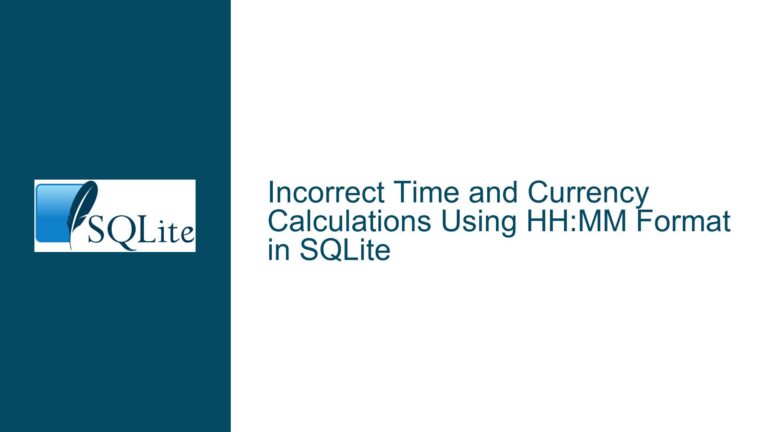Resolving SQLite Query Issues with Date Formatting, Subject Renaming, and Pass/Fail Results
Understanding the Required Output, Data Constraints, and Initial Query Flaws
The goal is to generate a result set containing four columns: unique_id, test_date (formatted as MM/DD/YYYY), subject (renamed from "Science" to "Biology"), and result ("Passed" or "Not Passed") for students with valid test dates. The initial query attempts to achieve this but contains critical errors in SQL syntax, logic, and data handling.
Key Requirements Breakdown
- Valid Test Dates: Only include rows where
test_dateis valid (non-null and properly formatted). - Date Formatting: Convert
test_datefrom ISO format (YYYY-MM-DD) to MM/DD/YYYY. - Subject Renaming: Replace "Science" with "Biology" in the
subjectcolumn. - Result Determination: Translate the numeric
passedcolumn (0 or 1) to "Not Passed" or "Passed".
Initial Query Deficiencies
- Unnecessary Data Modification: The
UPDATEstatement permanently alters thesubjectcolumn in the table, violating the requirement to project transformed data without modifying source data. - Incorrect String Replacement Logic: Using
REPLACE(passed, "1", "Passed")misapplies theREPLACEfunction, which operates on string patterns within a column, not conditional value mapping. - Date Formatting Error:
STRFTIME('%d/%m/%Y', test_date)uses a format string that produces DD/MM/YYYY instead of the required MM/DD/YYYY. - Ambiguous Filtering:
WHERE test_date IS NOT NULLassumes that non-null dates are valid, but does not account for invalid date strings or formatting issues. - Column Reference Errors: Using double quotes (
"1","0") around numeric literals treats them as identifiers (column/table names), causing syntax errors.
Root Causes of Query Failures and Data Ambiguities
1. Misuse of SQL Functions and Clauses
REPLACE()Function Misapplication:
TheREPLACEfunction replaces substrings within a column. For example,REPLACE(passed, "1", "Passed")attempts to replace the substring "1" in thepassedcolumn, which contains integers (0 or 1). Since integers are not strings, this operation fails. Even ifpassedwere a string, this approach would not work for binary conditions.Incorrect Date Format Specifier:
The format string%d/%m/%YinSTRFTIMEproduces a day-first date (e.g., 10/04/2022 for April 10, 2022), conflicting with the required MM/DD/YYYY format (04/10/2022).
2. Data Integrity and Schema Issues
Invalid or Missing Test Dates:
Rows with emptytest_date(e.g.,1188946,Science,,) are excluded byWHERE test_date IS NOT NULL, but the filter does not handle malformed dates (e.g., "2019-02-30" would be invalid but not NULL).Non-Unique
unique_idEntries:
The dataset includes duplicateunique_idvalues (e.g., 1147005 appears twice), suggesting either multiple test attempts per student or a misnamed column (e.g.,unique_idmight represent test attempts, not students).Ambiguous "Passed" Logic:
The requirement states, "if the student passed the test return the text ‘Passed’ or ‘Not Passed’." This phrasing is ambiguous but implies a direct mapping: 1 → "Passed", 0 → "Not Passed". The initial query fails to handle NULLpassedvalues (e.g.,1237354,Science,,), which should likely be excluded.
3. Structural and Semantic Errors
Unnecessary Data Modification:
TheUPDATE mock_test_results SET subject = "Biology";statement alters allsubjectvalues to "Biology", destroying the original data. This violates the principle of non-destructive querying for reporting purposes.Identifier vs. String Confusion:
Using double quotes ("Biology","1") instead of single quotes ('Biology','1') causes syntax errors. In SQLite, double quotes enclose identifiers (e.g., column names), while single quotes denote string literals.
Step-by-Step Solutions for Query Correction and Data Validation
1. Correcting the SELECT Statement Without Data Modification
Remove the UPDATE Statement:
Execute only a SELECT query to project transformed data without altering the source table:
SELECT
unique_id,
-- Date formatting and renaming logic will go here
-- Subject renaming and result translation will go here
FROM mock_test_results
WHERE [valid date condition];
Rename "Science" to "Biology":
Use a CASE expression or literal replacement:
SELECT
unique_id,
-- ... other columns ...
'Biology' AS subject, -- All subjects are "Science", so hardcode "Biology"
-- ... result logic ...
FROM mock_test_results
WHERE [conditions];
Format test_date as MM/DD/YYYY:
Use STRFTIME with the correct format specifiers:
STRFTIME('%m/%d/%Y', test_date) AS test_date
Translate passed to "Passed" or "Not Passed":
Use a CASE expression for conditional mapping:
CASE
WHEN passed = 1 THEN 'Passed'
WHEN passed = 0 THEN 'Not Passed'
ELSE 'Invalid' -- Handle NULLs or unexpected values
END AS result
2. Filtering Valid Test Dates
Basic Filtering (Non-NULL Dates):
Exclude rows where test_date is NULL:
WHERE test_date IS NOT NULL
Advanced Date Validation:
To ensure test_date is a valid date, use SQLite’s date validation function (note: SQLite does not natively validate dates; invalid dates return NULL when parsed):
WHERE DATE(test_date) IS NOT NULL
3. Final Query Assembly
Combining all corrections:
SELECT
unique_id,
STRFTIME('%m/%d/%Y', test_date) AS test_date,
'Biology' AS subject,
CASE
WHEN passed = 1 THEN 'Passed'
WHEN passed = 0 THEN 'Not Passed'
ELSE 'Invalid'
END AS result
FROM mock_test_results
WHERE test_date IS NOT NULL
AND DATE(test_date) IS NOT NULL;
4. Handling Edge Cases and Data Ambiguities
Duplicate unique_id Entries:
If the goal is to list all test attempts (including duplicates), no action is needed. If only the latest attempt is required, use a subquery with ROW_NUMBER():
WITH ranked_results AS (
SELECT
*,
ROW_NUMBER() OVER (PARTITION BY unique_id ORDER BY test_date DESC) AS rank
FROM mock_test_results
WHERE test_date IS NOT NULL
)
SELECT
unique_id,
STRFTIME('%m/%d/%Y', test_date) AS test_date,
'Biology' AS subject,
CASE
WHEN passed = 1 THEN 'Passed'
WHEN passed = 0 THEN 'Not Passed'
END AS result
FROM ranked_results
WHERE rank = 1;
Handling NULL passed Values:
Exclude rows where passed is NULL by adding AND passed IS NOT NULL to the WHERE clause.
5. Best Practices for Query Design
- Avoid Data Modification for Reporting: Use
SELECTtransformations instead ofUPDATEunless persistence is explicitly required. - Explicit Column Aliasing: Use
ASto clarify computed columns (e.g.,STRFTIME(...) AS test_date). - Validate Input Data: Use
DATE()or custom checks to filter invalid dates. - Use Single Quotes for Literals: Always enclose string literals in single quotes (
'Biology','Passed').
By addressing syntax errors, misapplied functions, and data integrity checks, the final query meets all specified requirements while preserving the original dataset.






